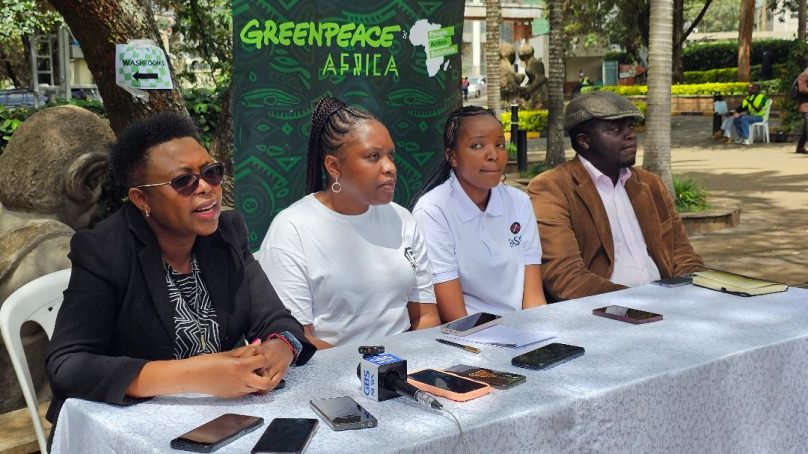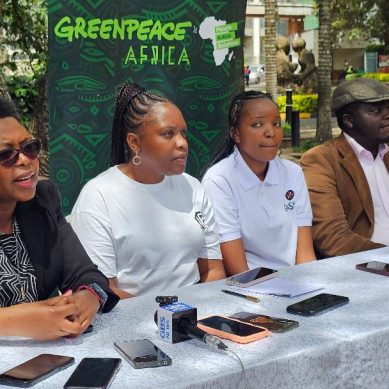
An environmental lobby group wants Kenya government to shield the country from adverse effects of using single-use plastics.
Speaking in Nairobi during the launch of Refill and Reuse Festival to Single-Use Plastics Festival last week, Greenpeace Africa Project Officer Hellen Dena said the country needs to transition to sustainable packaging systems that protect the environment and creating economic opportunities for Kenyans.
Dena said enhancing refill and reuse for single-use plastics is not only a panacea to ecological health but a model that can help in fighting poverty through creation of jobs for Kenyans.
The project officer observed that enhancing refill and reuse models has the potential to reduce the hidden costs of plastic pollution that burden governments and taxpayers.
“Refill and reuse systems are not new to Africa. They are rooted in our culture and have existed since time immemorial. What is new is the invasion of single-use plastics pushed by corporations prioritising profit over people and planet. Governments must invest in refill infrastructure and set clear targets that make reuse the norm, not the exception,” said the official in a press statement sent to media houses.
“Throw-away culture is expensive. Countries spend billions of dollars to clean up drainage systems, build incinerators, clean up rivers and cover health expenses linked to plastic pollution,” she pointed out.
The two-day festival that ran from November 14-15 brought together local communities, civil society organisations, policymakers, manufacturers and innovators to showcase refill and reuse options available in Kenya.
The organisers also discussed the need to create space for policy discussions on the opportunities and challenges of mainstreaming sustainable alternatives to single-use plastics.
The festival underscored the need to come up with efficient handling of single –use plastics in the country, noting that alternatives to throwaway plastic culture are practical, affordable, and aligned with African values of community and resourcefulness.
“Recycling is a distraction that allows corporations to keep producing more plastic while shifting responsibility to consumers and governments. Plastics persist in the environment throughout their lifecycle, leaching harmful chemicals into our soil, water, and bodies,” Gerance Mutwol, Plastics Campaigner at Greenpeace Africa, says.
“Refill and reuse systems prevent plastic pollution at source. They conserve resources, create jobs, and protect public health. This is an environmental imperative and economic opportunity that governments can no longer ignore.”
Among those who were invited for the two-day festival included families, education institutions, artists and innovators who used the event to showcase hands-on refill stations, zero-waste exhibitions, and children’s upcycling art competitions.
In August 2022 Greenpeace Africa had poked holes into Kenya’s ability to put to rest the plastic waste menace by the year 2030.
According to the group, an earlier report by the Kenya Plastics Pact (KPP) to ensure all plastic packaging in the country is recyclable in eight years’ time was too ambitious and unattainable. The lobby group claimed the country’s production of plastic materials currently outstrips her ability to recycle the wastes.
The pact that brings together stakeholders across the plastic value chain had published a roadmap plan whose objective was to ensure all plastic packaging in the country is recyclable or reusable by the year 2030.
“Data shows we can’t recycle our way out of the plastics crisis. Recycling does not match the scale of the plastic that’s being produced, which is one of the reasons why only nine per cent of all the plastic waste produced has been recycled. With plastic production projected to increase in the coming years, Kenya will never be able to solve this crisis with only recycling,” said Greenpeace through a press statement.
The group similarly averred that even from highly developed countries with huge investments in recycling and advanced technology, the recycling rate falls short of 50 per cent with a minimal percentage of it finally being converted back to packaging.
At the time the NGO had also accused big plastic producers of being behind the plastic pollution threat in the country. The environmental lobby group pointed out that as long as large companies continue with mass production of plastic products, the challenge of addressing the problem will never be solved.
“While efforts by different stakeholders in reducing plastic pollution is critical and is a clear indication of a growing trend, it isn’t enough to solve the cascade of plastic pollution in the country. The real culprits are the big polluters. As long as the companies responsible for this plastic crisis do not stop the massive production of this toxic substance, the urban landscape, the oceans and the ecosystem in general will continue to be threatened,” read the statement.
“Kenya has been grappling with the impacts of single-use plastics for many years now. In most of the urban areas across the country, plastic waste is clogging the waterways leading to floods and destruction. Scientists have also found micro plastics in the food we eat, the water we drink and even in blood. While the overall effects are not yet known, micro plastics are known to damage human cells; there are concerns they could affect immune functions,” the statement continues.
The environmental lobby group said the best remedy for the crisis was to commit the biggest polluters and other stakeholders to step up and drive change by investing in alternative delivery channels and packaging that prioritize refill and reuse models.
Greenpeace Africa also wanted members of the Plastic Pact to work towards achieving an effective legally-binding global plastics treaty to cap and reduce production, use and ultimately end single-use plastic pollution in coming years.
In 2023, more than 170 civil society groups and scientists across the world had raised fears over the possible influence of large industrial players in the UN Global Plastics Treaty talks that took place in Paris from May 29 to June 2.
In a letter signed by among others UN Messenger of Peace Jane Goodall and addressed to UNEP Director Inger Anderson, the lobbyists wanted delegates to thwart the fossil fuel industry from undermining negotiations in pushing for an effective Global Plastic Treaty.
Among its key objectives, the treaty wanted nations to commit to a legally binding agreement to end plastic pollution by last year. The campaigners had warned that that lack of action to safeguard the initial objectives of the Treaty would jeopardize efforts to reduce plastic waste around the globe whose production is expected to triple by 2050.
To date no binding pact has been ratified on ending use of plastics. Kenya, just like many developing countries is facing an environmental crisis owing to an increase in plastic pollution that has threatened both land and marine life.
For instance, Nairobi alone generates about 3,207 tonnes of waste daily, according to UN-Habitat. Globally, plastic leakage to the environment is seen doubling to 44 million tonnes a year, while the build-up of plastics in lakes, rivers and oceans will more than triple, as plastic waste balloons from 460 million metric tonnes in 2019 million to 1,231 million metric tonnes in 2060.
Most pollution comes from larger debris known as macro plastics, but leakage of micro plastics (synthetic polymers less than 5mm in diameter) from items like industrial plastic pellets, textiles and tyre wear has also been found to be of serious concern.
A Global Plastics Outlook Policy Scenarios to 2060 Report by the Organisation for Economic Co-operation and Development (OECD), notes that without radical action to curb demand, increase product lifespans and improve waste management and recyclability, plastic pollution will rise in tandem with an almost threefold increase in plastics use driven by rising populations and incomes.
The report further estimates that almost two-thirds of plastic waste in 2060 will be from short-lived items such as packaging, low-cost products and textiles.
“If we want a world that is free of plastic pollution, in line with the ambitions of the United Nations Environment Assembly, we will need to take much more stringent and globally coordinated action,” said OECD Secretary-General Mathias Cormann in the report released in February 2023.
“This report proposes concrete policies that can be implemented along the lifecycle of plastics that could significantly curb – and even eliminate – plastic leakage into the environment,” according to the report.
- A Tell Media / KNA report / By Samuel Maina





